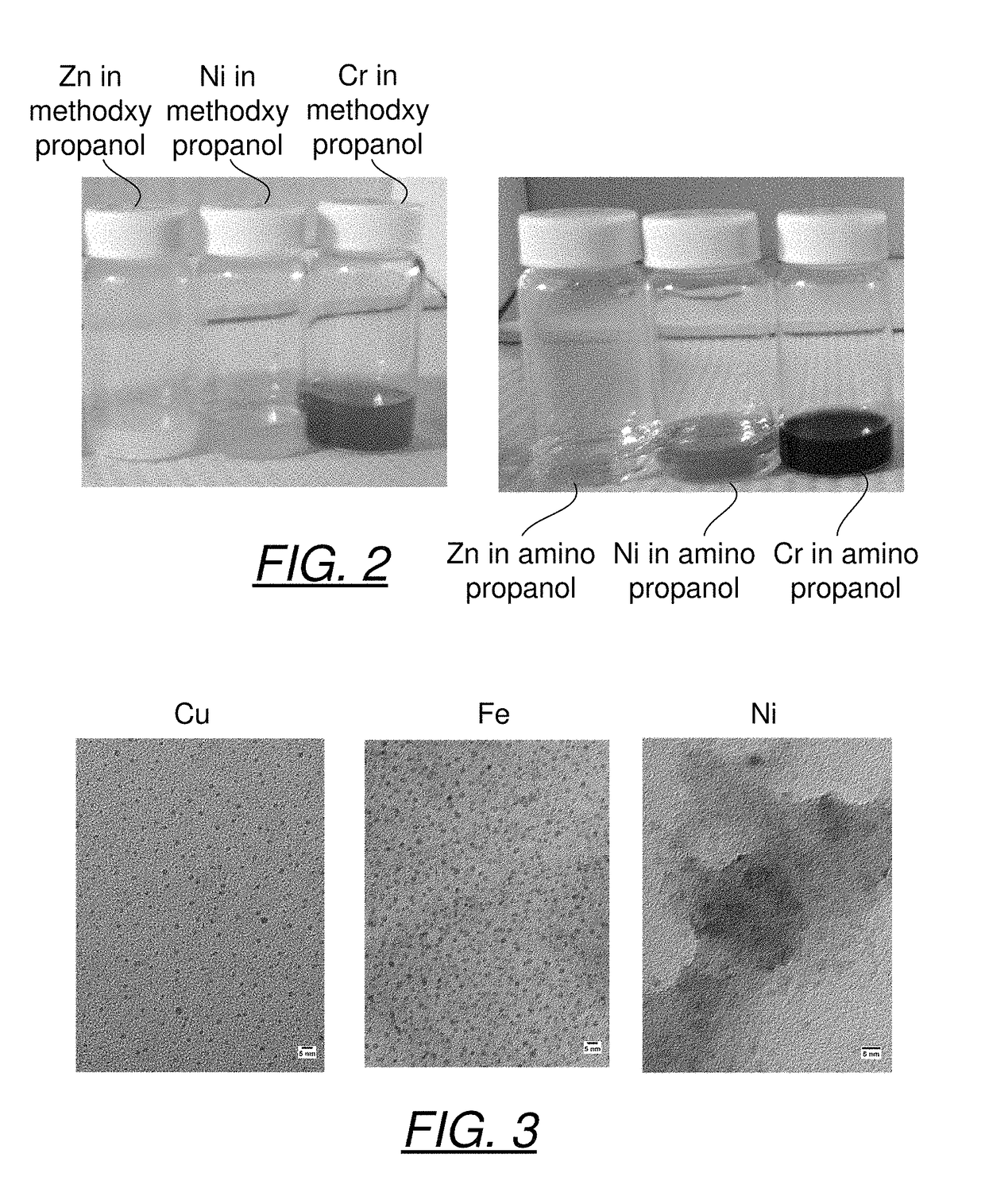Method of producing metallic nano particle colloidal dispersions
a colloidal dispersant and metal-containing technology, applied in colloidal chemistry, metal/metal-oxide/metal-hydroxide catalysts, physical/chemical process catalysts, etc., can solve the problems of thwarting the reduction process, difficult to find or synthesize these metals in a free and reduced state, and difficult to use, so as to achieve high suspension density metal colloids, minimize or eliminate ancillary chemical steps, good low temperature sintering properties
- Summary
- Abstract
- Description
- Claims
- Application Information
AI Technical Summary
Benefits of technology
Problems solved by technology
Method used
Image
Examples
example 1
[0072]Into three separate 20 ml scintillation vials were introduced 1 mmole of nickel acetate tetra hydrate (273.72 mg), 1 mmole of cobalt hexahydrate (254.16 mg) or 1 mmole of ferric chloride hexahydrate (270.3 mg). The powders were solubilized by the addition of 7 ml of hot 18M Ohm deionized water. Additionally, the ferric chloride (yellow orange color) was converted to iron acetate (red color) by the addition of 3 mmoles of sodium acetate (246.1 mg). Then 1.1 mmole of BiPY (171.8 mg) in 7 ml of hot ethanol were introduced into each of the metal acetate solutions. The subsequent metal cation reduction was carried out under an argon gas blanket by the addition of 0.5 ml of 35% hydrazine (in water) solution (5 mmole). The experiment was repeated with 1.1 mmole of 1,10 phenanthroline (198.13 mg) substituting for the BiPY.
[0073]FIG. 1A is a pairwise photo comparison of these metals makes (Ni, Co, Fe,) first with 1.1:1 BiPY and then 1,10 phenanthroline. There does not appear to be any ...
example 2
[0074]Due to the propensity to form oxides, reduced metal dispersions of zinc and chromium are difficult to produce and may be dependent upon the nature of the solvent the metal precursors are dispersed in. Methoxy-propanol was used to solubilize separately zinc acetate (clear solution), nickel acetate (pale blue solution) and chromium acetate (black purple solution). To each of these was added an excess of the stabilizer BiPY. Charge transfer complexes were formed that only intensified the original color. As seen in the first three vials in FIG. 2, the addition of an excess of hydrazine monohydrate caused the zinc complex to go milky white (ZnO), the nickel complex went milky blue (nickel oxide) and the chromium complex to go a murky dark purple (oxide formation). Thus, this solvent is not well suited to prepare the reduced metals of these materials. This experiment was repeated replacing the methoxy-propanol with 1-amino-2-propanol. Very translucently clear nanoparticle dispersion...
example 3
[0076]FIG. 4 depicts the formation of titanium nanoparticles. 0.5 mmole (142.11 mg) of titanium isopropoxide (anhydrous) were dissolved in 6 ml of hot 18M Ohm deionized water in a scintillation vial. To this was added 1 mmole (198.13 mg) of 1,10 phenanthroline dissolved in 2.25 ml of propane diol, 4.5 ml of isopropanol and 6 ml of 18 MOhm deionized water. The reduction was carried out by adding 0.5 ml (6.4 mmole) of 64% N2H4:H2O. As seen in the left panel of FIG. 4, a clear dispersion of titanium nanoparticles scatters light in a tightly focused beam (indicating a somewhat uniform and small particle size. This dispersion was stable for more than two months. In the right panel of FIG. 4 is a similar titanium isopropoxide make using BiPY to replace the 1,10 phenanthroline and substituting propane glycol monomethyl ether for the water on the stabilizer side. Again a similar good and small particle dispersion of titanium nanoparticles was made.
PUM
| Property | Measurement | Unit |
|---|---|---|
| temperature | aaaaa | aaaaa |
| particle size | aaaaa | aaaaa |
| boiling temperature | aaaaa | aaaaa |
Abstract
Description
Claims
Application Information
 Login to View More
Login to View More - R&D
- Intellectual Property
- Life Sciences
- Materials
- Tech Scout
- Unparalleled Data Quality
- Higher Quality Content
- 60% Fewer Hallucinations
Browse by: Latest US Patents, China's latest patents, Technical Efficacy Thesaurus, Application Domain, Technology Topic, Popular Technical Reports.
© 2025 PatSnap. All rights reserved.Legal|Privacy policy|Modern Slavery Act Transparency Statement|Sitemap|About US| Contact US: help@patsnap.com



